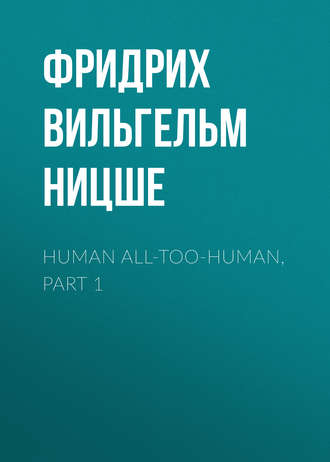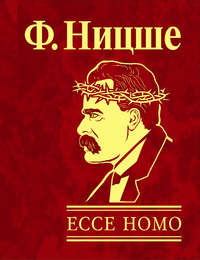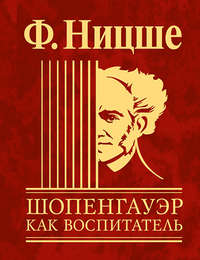 полная версия
полная версияHuman All-Too-Human, Part 1
The Destiny of Greatness. – Every great phenomenon is followed by degeneration, especially in the world of art. The example of the great tempts vainer natures to superficial imitation or exaggeration; all great gifts have the fatality of crushing many weaker forces and germs, and of laying waste all nature around them. The happiest arrangement in the development of an art is for several geniuses mutually to hold one another within bounds; in this strife it generally happens that light and air are also granted to the weaker and more delicate natures.
159Art Dangerous For the Artist. – When art takes strong hold of an individual it draws him back to the contemplation of those times when art flourished best, and it has then a retrograde effect. The artist grows more and more to reverence sudden inspirations; he believes in gods and dæmons, he spiritualises all nature, hates science, is changeable in his moods like the ancients, and longs for an overthrow of all existing conditions which are not favourable to art, and does this with the impetuosity and unreasonableness of a child. Now, in himself, the artist is already a backward nature, because he halts at a game that belongs properly to youth and childhood; to this is added the fact that he is educated back into former times. Thus there gradually arises a fierce antagonism between him and his contemporaries, and a sad ending; according to the accounts of the ancients, Homer and Æschylus spent their last years, and died, in melancholy.
160Created Individuals. – When it is said that the dramatist (and the artist above all) creates real characters, it is a fine deception and exaggeration, in the existence and propagation of which art celebrates one of its unconscious but at the same time abundant triumphs. As a matter of fact, we do not understand much about a real, living man, and we generalise very superficially when we ascribe to him this and that character; this very imperfect attitude of ours towards man is represented by the poet, inasmuch as he makes into men (in this sense "creates") outlines as superficial as our knowledge of man is superficial. There is a great deal of delusion about these created characters of artists; they are by no means living productions of nature, but are like painted men, somewhat too thin, they will not bear a close inspection. And when it is said that the character of the ordinary living being contradicts itself frequently, and that the one created by the dramatist is the original model conceived by nature, this is quite wrong. A genuine man is something absolutely necessary (even in those so-called contradictions), but we do not always recognise this necessity. The imaginary man, the phantasm, signifies something necessary, but only to those who understand a real man only in a crude, unnatural simplification, so that a few strong, oft-repeated traits, with a great deal of light and shade and half-light about them, amply satisfy their notions. They are, therefore, ready to treat the phantasm as a genuine, necessary man, because with real men they are accustomed to regard a phantasm, an outline, an intentional abbreviation as the whole. That the painter and the sculptor express the "idea" of man is a vain imagination and delusion; whoever says this is in subjection to the eye, for this only sees the' surface, the epidermis of the human body, – the inward body, however, is equally a part of the idea. Plastic art wishes to make character visible on the surface; histrionic art employs speech for the same purpose, it reflects character in sounds. Art starts from the natural ignorance of man about his interior condition (in body and character); it is not meant for philosophers or natural scientists.
161The Over-valuation of Self in the Belief in Artists and Philosophers. – We are all prone to think that the excellence of a work of art or of an artist is proved when it moves and touches us. But there our own excellence in judgment and sensibility must have been proved first, which is not the case. In all plastic art, who had greater power to effect a charm than Bernini, who made a greater effect than the orator that appeared after Demosthenes introduced the Asiatic style and gave it a predominance which lasted throughout two centuries? This predominance during whole centuries is not a proof of the excellence and enduring validity of a style; therefore we must not be too certain in our good opinion of any artist, – this is not only belief in the truthfulness of our sensations but also in the infallibility of our judgment, whereas judgment or sensation, or even both, may be too coarse or too fine, exaggerated or crude. Neither are the blessings and blissfulness of a philosophy or of a religion proofs of its truth; just as little as the happiness which an insane person derives from his fixed idea is a proof of the reasonableness of this idea.
162The Cult of Genius For the Sake of Vanity. – Because we think well of ourselves, but nevertheless do not imagine that we are capable of the conception of one of Raphael's pictures or of a scene such as those of one of Shakespeare's dramas, we persuade ourselves that the faculty for doing this is quite extraordinarily wonderful, a very rare case, or, if we are religiously inclined, a grace from above. Thus the cult of genius fosters our vanity, our self-love, for it is only when we think of it as very far removed from us, as a miraculum, that it does not wound us (even Goethe, who was free from envy, called Shakespeare a star of the farthest heavens, whereby we are reminded of the line "die Sterne, die begehrt man nicht".11) But, apart from those suggestions of our vanity, the activity of a genius does not seem so radically different from the activity of a mechanical inventor, of an astronomer or historian or strategist. All these forms of activity are explicable if we realise men whose minds are active in one special direction, who make use of everything as material, who always eagerly study their own inward life and that of others, who find types and incitements everywhere, who never weary in the employment of their means. Genius does nothing but learn how to lay stones, then to build, always to seek for material and always to work upon it. Every human activity is marvellously complicated, and not only that of genius, but it is no "miracle." Now whence comes the belief that genius is found only in artists, orators, and philosophers, that they alone have "intuition" (by which we credit them with a kind of magic glass by means of which they see straight into one's "being")? It is clear that men only speak of genius where the workings of a great intellect are most agreeable to them and they have no desire to feel envious. To call any one "divine" is as much as saying "here we have no occasion for rivalry." Thus it is that everything completed and perfect is stared at, and everything incomplete is undervalued. Now nobody can see how the work of an artist has developed; that is its advantage, for everything of which the development is seen is looked on coldly The perfected art of representation precludes all thought of its development, it tyrannises as present perfection. For this reason artists of representation are especially held to be possess of genius, but not scientific men. In reality, however, the former valuation and the latter under-valuation are only puerilities of reason.
163The Earnestness of Handicraft. – Do not talk of gifts, of inborn talents! We could mention great men of all kinds who were but little gifted. But they obtained greatness, became "geniuses" (as they are called), through qualities of the lack of which nobody who is conscious of them likes to speak. They all had that thorough earnestness for work which learns first how to form the different parts perfectly before it ventures to make a great whole; they gave themselves time for this, because they took more pleasure in doing small, accessory things well than in the effect of a dazzling whole. For instance, the recipe for becoming a good novelist is easily given, but the carrying out of the recipe presupposes qualities which we are in the habit of overlooking when we say, "I have not sufficient talent." Make a hundred or more sketches of novel-plots, none more than two pages long, but of such clearness that every word in them is necessary; write down anecdotes every day until you learn to find the most pregnant, most effective form; never weary of collecting and delineating human types and characters; above all, narrate things as often as possible and listen to narrations with a sharp eye and ear for the effect upon other people present; travel like a landscape painter and a designer of costumes; take from different sciences everything that is artistically effective, if it be well represented; finally, meditate on the motives for human actions, scorn not even the smallest point of instruction on this subject, and collect similar matters by day and night. Spend some ten years in these various exercises: then the creations of your study may be allowed to see the light of day. But what do most people do, on the contrary? They do not begin with the part, but with the whole. Perhaps they make one good stroke, excite attention, and ever afterwards their work grows worse and worse, for good, natural reasons. But sometimes, when intellect and character are lacking for the formation of such an artistic career, fate and necessity take the place of these qualities and lead the future master step by step through all the phases of his craft.
164The Danger and the Gain in the Cult of Genius. – The belief in great, superior, fertile minds is not necessarily, but still very frequently, connected with that wholly or partly religious superstition that those spirits are of superhuman origin and possess certain marvellous faculties, by means of which they obtained their knowledge in ways quite different from the rest of mankind. They are credited with having an immediate insight into the nature of the world, through a peep-hole in the mantle of the phenomenon as it were, and it is believed that, without the trouble and severity of science, by virtue of this marvellous prophetic sight, they could impart something final and decisive about mankind and the world. So long as there are still believers in miracles in the world of knowledge it may perhaps be admitted that the believers themselves derive a benefit therefrom, inasmuch as by their absolute subjection to great minds they obtain the best discipline and schooling for their own minds during the period of development. On the other hand, it may at least be questioned whether the superstition of genius, of its privileges and special faculties, is useful for a genius himself when it implants itself in him. In any case it is a dangerous sign when man shudders at his own self, be it that famous Cæsarian shudder or the shudder of genius which applies to this case, when the incense of sacrifice, which by rights is offered to a God alone, penetrates into the brain of the genius, so that he begins to waver and to look upon himself as something superhuman. The slow consequences are: the feeling of irresponsibility, the exceptional rights, the belief that mere intercourse with him confers a favour, and frantic rage at any attempt to compare him with others or even to place him below them and to bring into prominence whatever is unsuccessful in his work. Through the fact that he ceases to criticise himself one pinion after another falls out of his plumage, – that superstition undermines the foundation of his strength and even makes him a hypocrite after his power has failed him. For great minds it is, therefore, perhaps better when they come to an understanding about their strength and its source, when they comprehend what purely human qualities are mingled in them, what a combination they are of fortunate conditions: thus once it was continual energy, a decided application to individual aims, great personal courage, and then the good fortune of an education, which at an early period provided the best teachers, examples, and methods. Assuredly, if its aim is to make the greatest possible effect, abstruseness has always done much for itself and that gift of partial insanity; for at all times that power has been admired and envied by means of which men were deprived of will and imbued with the fancy that they were preceded by supernatural leaders. Truly, men are exalted and inspired by the belief that some one among them is endowed with supernatural powers, and in this respect insanity, as Plato says, has brought the greatest blessings to mankind. In a few rare cases this form of insanity may also have been the means by which an all-round exuberant nature was kept within bounds; in individual life the imaginings of frenzy frequently exert the virtue of remedies which are poisons in themselves; but in every "genius" that believes in his own divinity the poison shows itself at last in the same proportion as the "genius" grows old; we need but recollect the example of Napoleon, for it was most assuredly through his faith in himself and his star, and through his scorn of mankind, that he grew to that mighty unity which distinguished him from all modern men, until at last, however, this faith developed into an almost insane fatalism, robbed him of his quickness of comprehension and penetration, and was the cause of his downfall.
165Genius and Nullity. – It is precisely the original artists, those who create out of their own heads, who in certain circumstances can bring forth complete emptiness and husk, whilst the more dependent natures, the so-called talented ones, are full of memories of all manner of goodness, and even in a state of weakness produce something tolerable. But if the original ones are abandoned by themselves, memory renders them no assistance; they become empty.
166The Public. – The people really demands nothing more from tragedy than to be deeply affected, in order to have a good cry occasionally; the artist, on the contrary, who sees the new tragedy, takes pleasure in the clever technical inventions and tricks, in the management and distribution of the material, in the novel arrangement of old motives and old ideas. His attitude is the æsthetic attitude towards a work of art, that of the creator; the one first described, with regard solely to the material, is that of he people. Of the individual who stands between the two nothing need be said: he is neither "people" nor artist, and does not know what he wants – therefore his pleasure is also clouded and insignificant.
167The Artistic Education of the Public. – If the same motif is not employed in a hundred ways by different masters, the public never learns to get beyond their interest in the subject; but at last, when it is well acquainted with the motif through countless different treatments, and no longer finds in it any charm of novelty or excitement, it will then begin to grasp and enjoy the various shades and delicate new inventions in its treatment.
168The Artist and His Followers Must Keep in Step. – The progress from one grade of style to another must be so slow that not only the artists but also the auditors and spectators can follow it and know exactly what is going on. Otherwise there will suddenly appear that great chasm between the artist, who creates his work upon a height apart, and the public, who cannot rise up to that height and finally sinks discontentedly deeper. For when the artist no longer raises his public it rapidly sinks downwards, and its fall is the deeper and more dangerous in proportion to the height to which genius has carried it, like the eagle, out of whose talons a tortoise that has been borne up into the clouds falls to its destruction.
169The Source of the Comic Element. – If we consider that for many thousands of years man was an animal that was susceptible in the highest degree to fear, and that everything sudden and unexpected had to find him ready for battle, perhaps even ready for death; that even later, in social relations, all security was based on the expected, on custom in thought and action, we need not be surprised that at everything sudden and unexpected in word and deed, if it occurs without danger or injury, man becomes exuberant and passes over into the very opposite of fear – the terrified, trembling, crouching being shoots upward, stretches itself: man laughs. This transition from momentary fear into short-lived exhilaration is called the Comic. On the other hand, in the tragic phenomenon, man passes quickly from great enduring exuberance into great fear; but as amongst mortals great and lasting exuberance is much rarer than the cause for fear, there is far more comedy than tragedy in the world; we laugh much offener than we are agitated.
170The Artist's Ambition. – The Greek artists, the tragedians for instance, composed in order to conquer; their whole art cannot be imagined without rivalry, – the good Hesiodian Eris, Ambition, gave wings to their genius. This ambition further demanded that their work should achieve the greatest excellence in their own eyes, as they understood excellence, without any regard for the reigning taste and the general opinion about excellence in a work of art; and thus it was long before Æschylus and Euripides achieved any success, until at last they educated judges of art, who valued their work according to the standards which they themselves appointed. Hence they strove for victory over rivals according to their own valuation, they really wished to be more excellent; they demanded assent from without to this self-valuation, the confirmation of this verdict. To achieve honour means in this case "to make one's self superior to others, and to desire that this should be recognised publicly." Should the former condition be wanting, and the latter nevertheless desired, it is then called vanity. Should the latter be lacking and not missed, then it is named pride.
171What Is Needful to a Work of Art. – Those who talk so much about the needful factors of a work of art exaggerate; if they are artists they do so in majorem artis gloriam, if they are laymen, from ignorance. The form of a work of art, which gives speech to their thoughts and is, therefore, their mode of talking, is always somewhat uncertain, like all kinds of speech. The sculptor can add or omit many little traits, as can also the exponent, be he an actor or, in music, a performer or conductor. These many little traits and finishing touches afford him pleasure one day and none the next, they exist more for the sake of the artist than the art; for he also has occasionally need of sweetmeats and playthings to prevent him from becoming morose with the severity and self-restraint which the representation of the dominant idea demands from him.
172To Cause the Master to Be Forgotten. – The pianoforte player who executes the work of a master will have played best if he has made his audience forget the master, and if it seemed as if he were relating a story from his own life or just passing through some experience. Assuredly, if he is of no importance, every one will abhor the garrulity with which he talks about his own life. Therefore he must know how to influence his hearer's imagination favourably towards himself. Hereby are explained all the weaknesses and follies of "the virtuoso."
173Corriger La Fortune.– There are unfortunate accidents in the lives of great artists, which compel the painter, for instance, to sketch out his most important picture only as a passing thought, or such as obliged Beethoven to leave behind him only the insufficient pianoforte score of many great sonatas (as in the great B flat). In these cases the artist of a later day must endeavour to fill out the life of the great man, – of all orchestral effects, would call into life that symphony which has fallen into the piano-trance.
174Reducing. – Many things, events, or persons, cannot bear treatment on a small scale. The Laocoon group cannot be reduced to a knick-knack; great size is necessary to it. But more seldom still does anything that is naturally small bear enlargement; for which reason biographers succeed far oftener in representing a great man as small than a small one as great.
175Sensuousness in Present-day Art. – Artists nowadays frequently miscalculate when they count on the sensuous effect of their works, for their spectators or hearers have no longer a fully sensuous nature, and, quite contrary to the artist's intention, his work produces in them a "holiness" of feeling which is closely related to boredom. Their sensuousness begins, perhaps, just where that of the artist ceases; they meet, therefore, only at one point at the most.
176Shakespeare As a Moralist. – Shakespeare meditated much on the passions, and on account of his temperament had probably a close acquaintance with many of them (dramatists are in general rather wicked men). He could, however not talk on the subject, like Montaigne, but put his observations thereon into the mouths of impassioned figures, which is contrary to nature, certainly, but makes his dramas so rich in thought that they cause all others to seem poor in comparison and readily arouse a general aversion to them. Schiller's reflections (which are almost always based on erroneous or trivial fancies) are just theatrical Reflections, and as such are very effective; whereas Shakespeare's reflections do honour to his model, Montaigne, and contain quite serious thoughts in polished form, but on that account are too remote and refined for the eyes of the theatrical public, and are consequently ineffective.
177Securing a Good Hearing. – It is not sufficient to know how to play well; one must also know how to secure a good hearing. A violin in the hand of the greatest master gives only a little squeak when the place where it is heard is too large; the master may then be mistaken for any bungler.
178The Incomplete As the Effective. – Just as figures in relief make such a strong impression on the imagination because they seem in the act of emerging from the wall and only stopped by some sudden hindrance; so the relief-like, incomplete representation of a thought, or a whole philosophy, is sometimes more effective than its exhaustive amplification, – more is left for the investigation of the onlooker, he is incited to the further study of that which stands out before him in such strong light and shade; he is prompted to think out the subject, and even to overcome the hindrance which hitherto prevented it from emerging clearly.
179Against the Eccentric. – When art arrays itself in the most shabby material it is most easily recognised as art.
180Collective Intellect. – A good author possesses not only his own intellect, but also that of his friends.
181Different Kinds of Mistakes. – The misfortune of acute and clear authors is that people consider them as shallow and therefore do not devote any effort to them; and the good fortune of obscure writers is that the reader makes an effort to understand them and places the delight in his own zeal to their credit.
182Relation to Science. – None of the people have any real interest in a science, who only begin to be enthusiastic about it when they themselves lave made discoveries in it.
183The Key. – The single thought on which an eminent man sets a great value, arousing the derision and laughter of the masses, is for him a key to hidden treasures; for them, however, it is nothing more than a piece of old iron.
184Untranslatable. – It is neither the best nor the worst parts of a book which are untranslatable.
185Authors' Paradoxes. – The so-called paradoxes of an author to which a reader objects are often not in the author's book at all, but in the reader's head.
186WIT. – The wittiest authors produce a scarcely noticeable smile.
187Antithesis. – Antithesis is the narrow gate through which error is fondest of sneaking to the truth.
188Thinkers As Stylists. – Most thinkers write badly, because they communicate not only their thoughts, but also the thinking of them.
189Thoughts in Poetry. – The poet conveys his thoughts ceremoniously in the vehicle of rhythm, usually because they are not able to go on foot.
190The Sin Against the Reader's Intellect. – When an author renounces his talent in order merely to put himself on a level with the reader, he commits the only deadly sin which the latter will never forgive, should he notice anything of it. One may say everything that is bad about a person, but in the manner in which it is said one must know how to revive his vanity anew.









